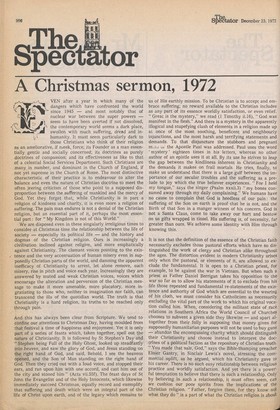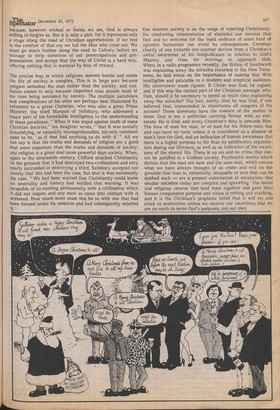A Christmas sermon, 1972 VEN after a year in which
many of the dangers which have confronted the world since 1945 — and most notably that of nuclear war between the super powers — seem to have been averted if not dissolved, the contemporary world seems a dark place, swollen with much suffering, dread and inhumanity. It must seem particularly dark to those Christians who think of their religion as an ameliorative, if meek, force; its Founder as a man essentially gentle and socially concerned; its doctrines as purely doctrines of compassion; and its effectiveness as like to that of a celestial Social Services Department. Such Christians are many in number, and dominant in the Church of England, if not yet supreme in the Church of Rome. The most distinctive characteristic of their practice is to endeavour to alter the balance and even the nature of Christian doctrine to meet the often jeering criticism of those who point to a supposed disproportion between the suffering of mankind and the mercy of God. Yet they forget that, while Christianity is in part a religion of kindness and charity, it is even more a religion of suffering. The pain man endures is not a denial of the Christian religion, but an essential part of it, perhaps the most essential part : for "My Kingdom is not of this World."
We are disposed even in these singularly irreligious times to consider at Christmas time the relationship between the life of society — especially its political life — and the history and dogmas of the Christian religion. Ours is increasingly a civilisation inclined against religion, and more emphatically against Christianity. The clamant voices pointing to the existence and the very accentuation of human misery even in supposedly Christian parts of the world, and damning the apparent inefficacy of Christianity to arrest, let, alone remove, such misery, rise in pitch and voice each year. Increasingly they are answered by muted and weak Christian voices, voices which encourage the alteration and perversion of the Christian message to make it more amenable, more placatory, more ingratiating to those who, neither in imagination nor faith, can transcend the ills of the quotidian world. The truth is that Christianity is a hard religion, its truths Ito be reached only through pain.
And this has always been clear from Scripture. We tend to confine our attentions to Christmas Day, having moulded from that 'festival a time of happiness and enjoyment. Yet it is only part of a series of feasts which, taken together, spell out the nature of Christianity. It is followed by St Stephen's Day and "Stephen being Full of the Holy Ghost, looked up steadfastly into heaven, and saw the glory of God, and Jesus standing on the right hand of God, and said, Behold, I see the heavens opened, and the Son of Man standing on the right hand of God. Then they cried out with a loud voice, and stopped their ears, and ran upon him with one accord, and cast him out of the city and stoned him" (Acts vii.55f). The feast days of St John the Evangelist and of the Holy Innocents, which likewise immediately succeed Christmas, equally record and exemplify that suffering and death which were an integral part of the life of Christ upon earth, and of the legacy which remains to us of His earthly mission. To be Christian is to accept and embrace suffering; no reward available to the Christian includes as any part of its essence worldly satisfaction, or even relief. "Great is the mystery," we read (1 Timothy ii.16), "God was manifest in the flesh." And there is a mystery in the apparently illogical and 'stupefying clash of elements in a religion made up at once of the ,most soothing, beneficent and neighbourly injunctions, and the most harsh and 'terrifying statements and demands. To that disjuncture the stubborn and pregnant mau L), the Apostle Paul was addressed. Paul uses the word ' mystery ' eighteen times in his letters, whereas no other author of an epistle uses it at all. By its use be strives to leap the gap between the kindliness inherent in 'Christianity and the demands it makes on frail mortals He tries, finally, to make us understand that there is a large gulf between the importance of our secular troubles and the suffering as a prelude to joy which the true believer experiences. "For I held my tongue," says the singer (Psalm xxxii.3) "my bones consumed away through my daily complaining." We humans have no cause to complain that God is heedless of our pain: the suffering of the Son on earth is proof that he is not, and the Birth of that Son in a manger witness of bis concern. God is not a Santa Claus, come to take away our hurt and bestow on us gifts wrapped in tinsel. His suffering is, of necessity, far greater than ours. We achieve some identity with Him through knowing 'this.
It is not that the definition of the essence of the Christian faith necessarily excludes those pastoral efforts which have so distinguished the work of clergy and Christian alike throughout the ages. The distortion evident in modern Christianity arises only when the pastoral, or elements of it,.are allowed to exclude the fundamental. It is open to a Christian priest, for example, to be against the war in Vietnam. But when such a priest as Father Daniel Berrigan takes 'his opposition to the war so far as to allow his statements of it to exclude from his life those repeated and fundamental re-statements of the existence and authority of God which are essential to the wearing of his cloth, we must consider his Catholicism as necessarily excluding the vital part of the work to which his original vocation called him. When, considering the militant state of race relations in Southern Africa the World Council of Churches chooses to subvent a given side they likewise — and apart altogether from their folly in supposing 'that money given for supposedly humanitarian 'purposes will not 'be used to 'buy guns — abandon the encompassing charity which should distinguish their 'Christianity and choose instead to interpret the doctrines of a political faction as the repository of Christian truth. "You made that 'sale, God," says the Bible-thumping preacher Elmer Gantry, in Sinclair Lewis's novel, stressing the commercial uplift, as he argued, which 'his Christianity gave to his career. There is no such easy relationship between religious practice and worldly satisfaction. And yet there is a powerful temptation to believe that there is such a relationship. Only by believing in such a relationship, it must often seem, can we cushion our poor spirits from the implications of the Christian religion. "Father, forgive them, for they know ncit what they do "'is a part of what the Christian religion is about because, however wicked or feeble we are, God is always Willing to forgive us. But it is only a part, for it represents only a stage along the road of Christian apprehension. If we rest in the comfort of that cry we fail the Man who cried out. We must go much further along 'the road to Calvary before we manage to strip ourselves of our preoccupations and prepossessions, and accept that the way of Christ is a bard way, offering nothing that is material by way of reward.
The precise way in which religions operate beside and inside the life of society is complex. This is in large part because religion animates the man rather than the society; and confusion comes in only 'because imperfect man spends most of his time being animated by society. The multiple paradoxes and complications of 'his state are perhaps best illustrated by reference to a great Christian, who was also a great Prime Minister, the third Marquis of Salisbury, who addressed a major part of his formidable intelligence to the understanding Of these paradoxes. "When it was urged against truth of some Christian doctrine," his daughter wrote, "that it was morally unsatisfying, or rationally incomprehensible, his only comment used to be, as if that had anything to do with it.' " All we can say is that the truths and demands of religion are a good deal more important than the truths and demands of society; and religion is a great deal more powerful than society. When, again in the nineteenth century, Clifford attacked Christianity On the grounds that it had destroyed two civilisations and very nearly succeeded in destroying a third, Salisbury accepted not merely that this had been the case, but that it was necessarily the case. "We had been warned that Christianity could know no neutrality and history had verified that warning. It was incapable of co-existing permanently with a civilisation which it did not inspire and any such as came into contact with it Withered. How much more must this be so with one that had been formed under its auspices and had 'subsequently rejected Our western society is on the verge of rejecting Christianity. No comforting interpretation of statistics can conceal that fact and no welcome for the tepid embrace of some kind of agnostic humanism can avoid its _consequences. Christian charity of one towards one 'another derives from a Christian's awful awareness of his insignificance in relation to God's Majesty and from his strivings to approach Him. When, in a radio programme recently, the Bishop of Southwark was explaining away the miracles recorded in the New Testament, he laid stress on the importance of making that Writ intelligible and palatable to a modern and sceptical audience. His interviewer made riposte. If Christ was God, he argued, and if this was the central part of the Christian message, why, then, should it be necessary to spend so much time explaining away the miracles? The fact, surely, that he was God, if one believed that, transcended in importance all exegesis of his actions? Those questions have the essence of the matter in them: God is not a politician currying favour with an electorate. He is God; and every Christian's duty is towards Him. The love of man for man, or of man for his fellow-men, has and can.have no roots unless it is considered as a shadow of man's love for God, and an indication of human awareness that there is a higher purpose to life than its satisfactory organisation during our lifetimes, as well as an indication of the awareness of the eternal life. There is no sin and no crime that cannot be justified in a Godless society. Psychiatric nostra which dictate that the mad are sane and the sane mad, which excuse what we have always thought of as crime and evil on the grounds that man is, essentially, incapable of acts that can be dubbed such — are 'a present culmination of secularism. Our secular societies today are complex and sprawling. The moral and religious cement that held them together and gave their 'human components purpose and vision is rotting and cracking, and it is the Christian's prophetic belief that it will rot and crack to destruction unless we recover our awareness that we are on earth to serve God's purposes, not our own.











































 Previous page
Previous page